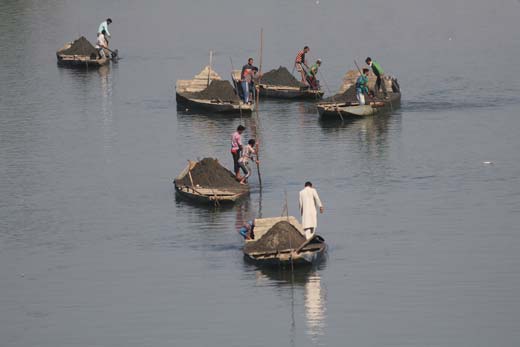Sand diggers of Jhelum are a woeful lot today. There is not enough fish anymore in the river for them to supplement their income and while the government collects royalty from them, sand diggers complain they receive no facilitation in return. Majid Maqbool reports.
 For thousands of people residing along the banks of river Jhelum and adjacent areas, digging into the river bed for collecting sand is about survival. Over the years, despite increasing hardships the sand diggers have stuck to this traditional practice. Even the harsh winter conditions do little to keep them away from delving into the river for livelihood. The sand diggers complain the officials don’t allow tippers near the riverbanks for transportation of sand. “What are we supposed to do then?” asked Mohammad Yousuf, a sand digger living along the banks of Jehlum near Zero Bridge, Rajbagh. “Should we deposit the sand back to the river? What will we feed our families then?”
For thousands of people residing along the banks of river Jhelum and adjacent areas, digging into the river bed for collecting sand is about survival. Over the years, despite increasing hardships the sand diggers have stuck to this traditional practice. Even the harsh winter conditions do little to keep them away from delving into the river for livelihood. The sand diggers complain the officials don’t allow tippers near the riverbanks for transportation of sand. “What are we supposed to do then?” asked Mohammad Yousuf, a sand digger living along the banks of Jehlum near Zero Bridge, Rajbagh. “Should we deposit the sand back to the river? What will we feed our families then?”
Yousuf, a middle aged man has been associated with sand digging since his childhood.He inherited the ‘profession’ from his father. Yousuf says now it’s getting difficult to earn a livelihood out of sand digging as government puts too many restrictions on their work.
“We pay monthly royalty to the government and also a yearly amount, but still the government creates problems for us instead of facilitating our work,” says Yousuf.
People involved in sand digging say a family on an average working day earns around Rs 900. Four people working in one boat can collect around 200 square feet of sand in a day from the riverbed. Their day usually starts early in the morning when the sand diggers take to the river with their boatssoon after offering morning prayers. “We can make around Rs 12,000 per month from this work. But out of that we have to pay royalty and other funds to the government,” said Manzoor. “And then we have to pay the laborers as well. Whatever is left is kept for our family.”
The recent trend of using sand machines by the government agencies to collect sand from Jhelum has added to the worries of the manual sand diggers. The machine does it quickly for the government agencies,” said worried sand digger.
From Sampora in Pampore to the Zero Bridge area in Rajbagh, about 700 families are dependent on sand digging, including 80 from Pantha Chowk, 40 from Athwajan and 500 in Pampore itself. “There must be more than 30,000 people from north to south who are dependent on this work,” said Rafiq Dar.“Government can’t turn a blind eye towards so many people and create more problems for us.”
Sand diggers say they have to pay a monthly royalty of Rs 700 to the government. “Now we have to pay the government another yearly amount,” says Rafiq.
In the past sand diggers also used to catch fish in the Jhelum, which was an alternate source of livelihood for them. But as the fish slowly began to disappear from the river, they had only sand to bank on, increasingly over the last two decades.
“Three months back, there was a danger of flood as the water level in Jhelum rose. We are the people who create depth in the river by digging out sand and it helps in preventing floods,” said another sand digger from Zero Bridge area.
The collection of sand is not an easy job for the sand diggers. They suffer many health problems, like back aches and joint problems that come with this manual work. But despite these health problems, they work daily in the riverto make a living. It gets tough especially in the harsh winter months, but people associated with sand digging have continued this traditional work passed on to them by their elders.
“In winter months our hands freeze,” said a sand digger, showing blisters on his hand as a result of continuous work in the riverbed. “Instead of providing us facilities in winter months, the government takes money from us.”
Manzoor Ahmad, a sand digger from Athwajan says in their area people associated with this work face similar problems. Around 30 homes are associated with sand digging in his area.“Besides paying royalty and an annual amount to the government, we have to pay Rs 400 in two months of May and June as well as the government wants us to stop digging sand in those months as they say it affects the fish,” said Manzoor.















